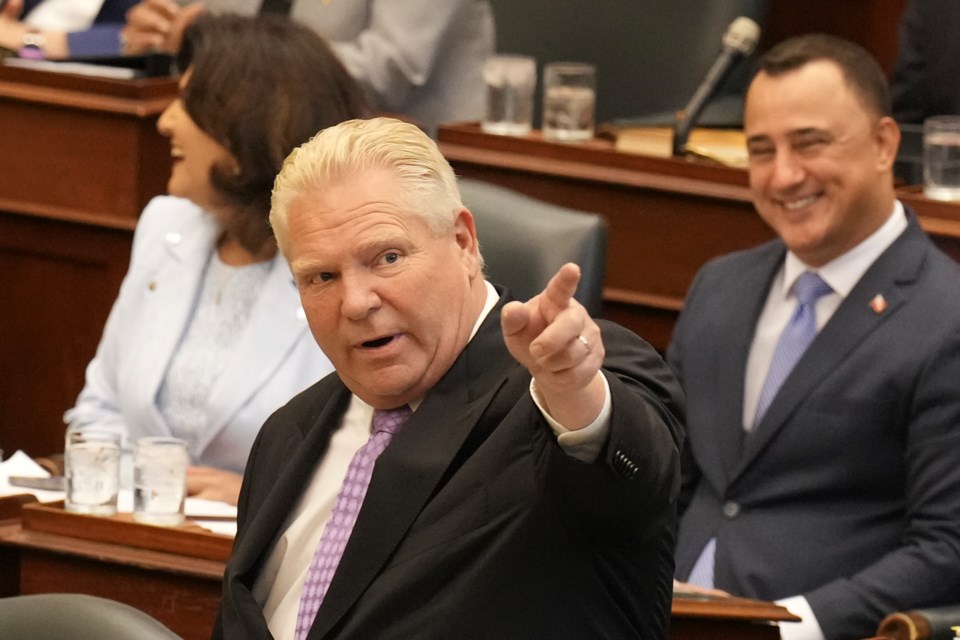Editor's note: This article originally appeared on The Trillium, a Village Media website devoted exclusively to covering provincial politics at Queen’s Park.
Charter advocates are launching a national campaign on the notwithstanding clause in hopes of drumming up public support for what they call a “deeply concerning” misuse of the tool governments can use to override Canadians' otherwise enshrined rights.
“In recent years, some provincial governments have increasingly used this clause to override basic rights and freedoms and try to prevent courts from striking down horrendous rights violations as unconstitutional,” Anaïs Bussières McNicoll, the director of the fundamental freedoms program with the Canadian Civil Liberties Association (CCLA), told reporters in Ottawa.
“This is deeply alarming.”
The campaign — entitled “Save Our Charter” — calls for three things; the first of which is for governments to simply not use the notwithstanding clause preemptively.
“This means that lawmakers should not use the notwithstanding clause until after receiving a final decision from a court on the constitutionality of a law,” Bussières McNicoll said.
An example of this was Ontario Premier Doug Ford’s government's use of the Section 33 clause in 2022 to prevent educational workers from striking amid contract negotiations. The Ford government repealed this Sec. 33-equipped legislation after quick and significant public outrage and protest.
The CCLA also wants to see a legislature supermajority required for the Charter override to be used.
Finally, it wants the courts to have the ability to strike down laws that invoke the notwithstanding clause in some cases.
“This would be the case when a law directly attacks the core fundamental rights, freedom or legal protection that existed well before the Charter was enacted,” Bussières McNicoll added. “No democratic society can thrive without robust protection of these rights.”
The campaign, which will include a petition and website spreading awareness of “the dangers of misuses of the notwithstanding clause,” comes amid new legislation expected to be tabled Thursday in Ontario cracking down on homeless encampments.
Ford, who encouraged mayors to publicly call on him to use the notwithstanding clause to clear encampments without ensuring residents had somewhere to go, recently backtracked on the preemptive use of the legal measure. Instead, he said he is “confident” the measures in the bill will be "common sense, practical and entirely aligned with the Charter of Rights and Freedoms."
However, the premier also noted, “Should the courts interfere with our shared goal of effectively addressing and clearing out encampments using these enhanced tools, with your support, our government is fully prepared to use the notwithstanding clause."
The CCLA said that while this would not be interpreted legally as preemptive use of the notwithstanding clause, they “have a very big problem” with this kind of statement.
“Courts have already recognized that unhoused people have a right to shelter, and if there is no safe shelter accessible and housing accessible, well, they have a right to be in encampments,” Bussières McNicoll said.
Constitutional lawyer and University of Ottawa professor Martha Jackman previously told The Trillium that it appears as though the premier is still threatening to use the notwithstanding clause.
"The premier seems to be holding Sec. 33 as a bit of a sword of Damocles hanging over any reaction to the legislation in the courts," she said.
The CCLA said it’s not just Ford who has been cavalier with the notwithstanding clause. Quebec Premier François Legault has suggested using it to ban praying in public, while in Saskatchewan, the provincial government used the notwithstanding clause to protect itself from legal challenges related to a law requiring consent for students under the age of 16 to change their names or pronouns while in school.
“I mean, this is a very, very dangerous trend,” Bussières McNicoll said.
“Our position is definitely that governments should be enacting laws that comply with the Charter, and they should be prepared to defend the constitutionality of their laws in front of courts.”
—With files from Alan S. Hale
